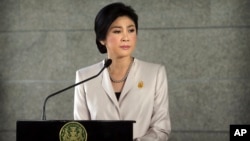Leaders of Thailand's Red Shirt movement, the key support base for Prime Minister Yingluck Shinawatra, say they are increasingly united behind her ruling Pheu Thai party and are preparing for February 2 polls.
The boisterous protesters who have turned out in Bangkok in recent weeks have dominated headlines and shaken the government, but their political clout at the polls is less impressive.
The so-called Yellow Shirts are largely made up of wealthier Bangkok residents, as well as Democrat Party allies in Thailand's south. Protest leaders have rejected the prime minister's call for elections in early February, which analysts say is a recognition that after a decade of election losses, they do not expect to win at the polls.
A Red Shirt leader, Thida Thavornseth, the chairwoman of the United Front for Democracy against Dictatorship, says the protesters stance against elections has electrified the prime minister's supporters.
"They are angry. People in the North, people in the North Eastern, people [in the] up country area, they are angry. I try to tell them to keep calm because we want just a few days.”
The UDD's political heart is in rural Thailand. But even there, not everyone has been supportive of the government's policies. After helping vote Ms. Yingluck into office in 2011, disagreements emerged as some factions felt they had been sidelined by the ruling party.
But UDD leader Thida says those internal political divisions have narrowed as their opponents have demanded the suspension of elections and creation of an unelected “people's council.”
Political scientist in the northeastern university of Ubon Rathchathani, Titipol Phakdeewanich, says the yellow shirt protesters have done little to reach out to voters in Thailand's rural heartland, alienating their movement from the voters they need.
"I don't think they really thought about this including people in Isaan or in the north because they still think that these people are not well educated. The more they use this kind of tactic, the more they actually force the Red Shirts to become more united and Thaksin will become stronger and stronger, he said."
The UDD, set up in 2006, was originally formed to support former Prime Minister Thaksin Shinawatra after his ouster in a coup. Since then, the movement has been a vital backer of pro-Thaksin governments.
Red Shirt groups have largely stayed quiet during the current standoff. They held days of rallies in a Bangkok stadium last month, but withdrew their supporters following deadly clashes.
Meanwhile, Bangkok protest leader Suthep Thuangsuban has kept up steady criticism of the prime minister, flatly rejected the proposed elections and continued to press for the creation of the non-elected ruling council that will propose major political reforms for the country.
Chris Baker, a commentator and author on Thai politics says the circumstances make for a complicated outlook.
"If you think for a minute about what Suthep is proposing - an 18 month interim parliamentary government while they think up reform - which is what they did after the coup (2006) and they want to try it again - it's outrageous - really outrageous. There seems to be this extraordinary faith that this process which has been done countless times before without achieving anything will suddenly deliver nirvana - unbelievable, he said."
Red Shirt leaders say they support talks on reforming the Thai political system, but say such talks must take place in parallel with the holding of the February 2 polls.
Red Shirts Pause During Thailand's Political Crisis
- By Ron Corben

BANGKOK —



